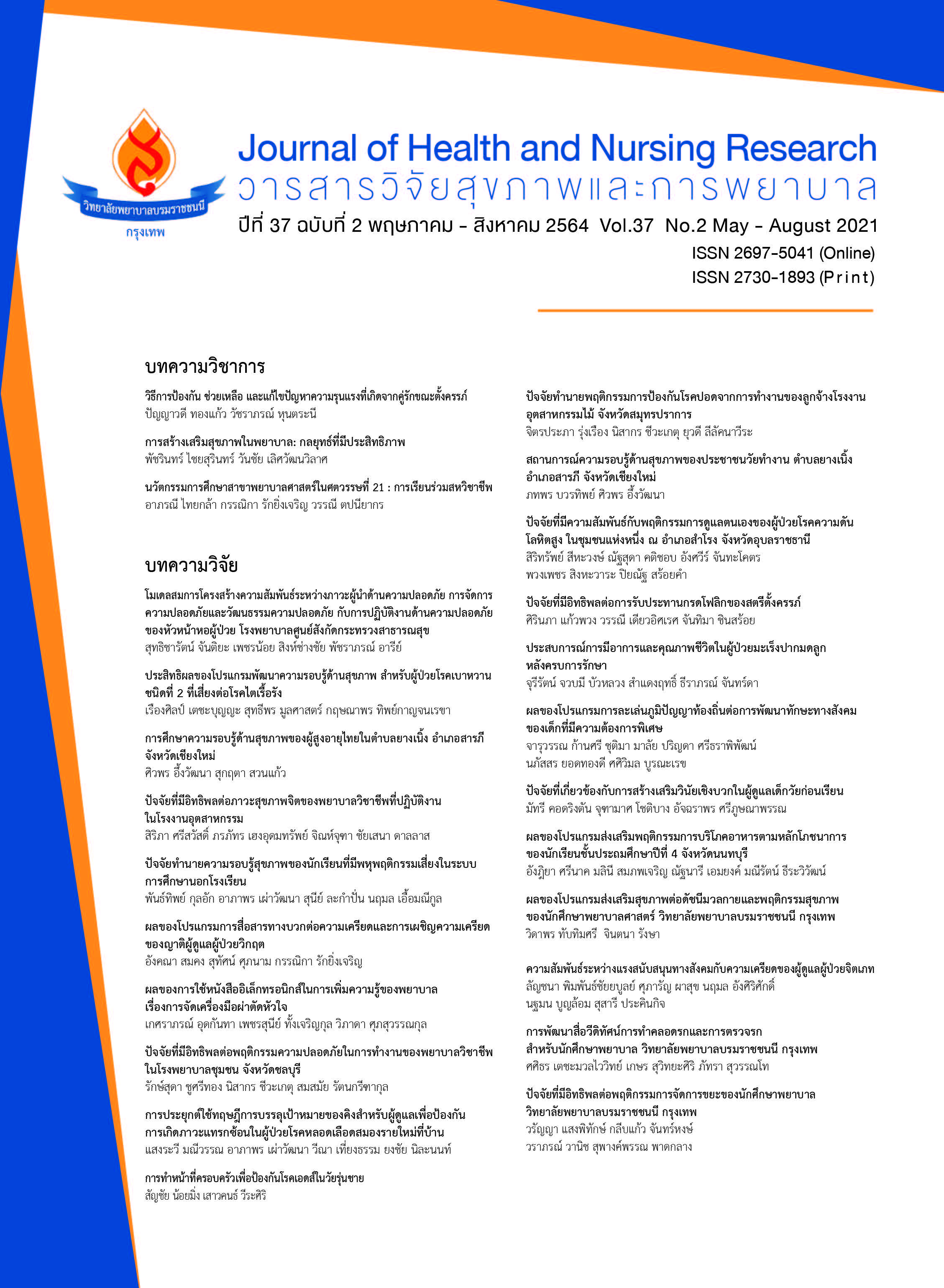ปัจจัยที่เกี่ยวข้องกับการสร้างเสริมวินัยเชิงบวกในผู้ดูแลเด็กวัยก่อนเรียน
คำสำคัญ:
การสร้างเสริมวินัยเชิงบวก, การรับรู้ประโยชน์, การรับรู้อุปสรรค, การสนับสนุนของครอบครัว, ผู้ดูแลเด็กวัยก่อนเรียนบทคัดย่อ
บทนำ: การสร้างเสริมวินัยเชิงบวกในผู้ดูแลเด็กวัยก่อนเรียนเป็นรูปแบบหนึ่งในการการพัฒนาทักษะสมองที่ดีในการจัดการชีวิตให้สำเร็จ เพื่อเติบโตไปเป็นผู้ใหญ่ที่คิดเป็น ทำเป็น แก้ปัญหาเป็น วัตถุประสงค์การวิจัย: การวิจัยเชิงพรรณนาหาความสัมพันธ์ครั้งนี้ มีวัตถุประสงค์เพื่อศึกษาการสร้างเสริมวินัยเชิงบวกของผู้แลเด็กวัยก่อนเรียน และศึกษาความสัมพันธ์ระหว่างการรับรู้ประโยชน์ การรับรู้อุปสรรค และการสนับสนุนทางสังคมของครอบครัวกับการสร้างเสริมวินัยเชิงบวกในผู้ดูแลเด็กวัยก่อนเรียน ระเบียบวิธีวิจัย: กลุ่มตัวอย่างเป็นผู้ดูแลเด็กวัยก่อนเรียนที่กำลังศึกษาในศูนย์พัฒนาเด็กเล็ก 3 แห่ง ในจังหวัดเชียงใหม่ จำนวน 85 ราย เลือกกลุ่มตัวอย่างแบบชั้นภูมิ ระหว่างเดือนมกราคมถึงเดือนกุมภาพันธ์ 2563 เครื่องมือที่ใช้ในการวิจัยประกอบด้วยแบบสอบถามจำนวน 5 ชุด วิเคราะห์ความสัมพันธ์ด้วยสถิติสหสัมพันธ์เพียร์สันและสถิติสหสัมพันธ์สเปียร์แมน ผลการวิจัย: ผลการวิจัยพบว่าผู้ดูแลเด็กวัยก่อนเรียนมีการสร้างเสริมวินัยเชิงบวก ("X" ̅= 58.76, SD = 6.28) และการรับรู้อุปสรรคของการสร้างเสริมวินัยเชิงบวก ("X" ̅=14.29, SD = 6.36) อยู่ในระดับปานกลาง แต่การรับรู้ประโยชน์ของการสร้างเสริมวินัยเชิงบวก ("X" ̅ = 23.26, SD = 3.12) และการสนับสนุนทางสังคมของครอบครัวในการสร้างเสริมวินัยเชิงบวก ("X" ̅= 27.45, SD = 6.80) อยู่ในระดับสูง การรับรู้ประโยชน์และการสนับสนุนทางสังคมของครอบครัวในการสร้างเสริมวินัยเชิงบวกในผู้ดูแลเด็กวัยก่อนเรียนมีความสัมพันธ์ทางบวกกับการสร้างเสริมวินัยเชิงบวกในผู้ดูแลเด็กวัยก่อนเรียน (r = .36, p < .05 และ r = .26, p < .05 ตามลำดับ) แต่การรับรู้อุปสรรคของการสร้างเสริมวินัยเชิงบวกในผู้ดูแลเด็กวัยก่อนเรียนมีความสัมพันธ์ทางลบกับการสร้างเสริมวินัยเชิงบวกในผู้ดูแลเด็กวัยก่อนเรียน (r = -.23, p < .05) สรุปผล:การรับรู้ประโยชน์และการสนับสนุนทางสังคมของครอบครัวมีความสัมพันธ์ทางบวกแต่การรับรู้อุปสรรคมีความสัมพันธ์ทางลบ และเป็นปัจจัยในการสร้างเสริมวินัยเชิงบวกในผู้ดูแลเด็กวัยก่อนเรียน ข้อเสนอแนะ: ผลการศึกษานี้เป็นข้อมูลพื้นฐานสำหรับพยาบาลที่ดูแลและส่งเสริมพัฒนาการเด็กวัยก่อนเรียน รวมถึงลดปัญหาพฤติกรรมที่ไม่พึงประสงค์ที่เกิดจากการเลี้ยงดูได้
Downloads
เอกสารอ้างอิง
Phusawang S. Parenting and early childhood training [Internet]. Chiangmai: home and community Human Faculty Chiangmai University; 2019 [cited 2019 April 15]. Available from: http://www. human.cmu.ac.th/home/hc/ebook/006103/lesson3/01.htm
Noimuang P, Ampremsin S, Rojmahamongkol P, Poyasin P, Chunsuwan I. The importance of preschool age 3-6 years. A guide for parents to disseminate knowledge about childcare and development. Bangkok: The Royal College of Pediatricians of Thailand & Pediatric Society of Thailand; 2014. p. 7-10.
Kotchapakdee N. Developmental screening guidelines for promoting child development in child development center. Meeting to prepare early childhood development screening campaign for 2015, Early Childhood Development Project in honor of HRH Princess Maha Chakri Sirindhorn The Princess Royal; 21 – 2 May 2015; Faculty of Medicine Ramathibodi Hospital National Institute for Child and Family Development Mahidol University. Bangkok.
National Institute of Child Health Department of Health Ministry of Public Health. Situation of Thai child development from a random survey in 2017 [Internet]. 2017 [cited 2019 March 20]. Available from: https://nich. anamai.moph.go.th
Kotchapakdee N. Child Development. In Hunsakunachai T, editors. Developmental textbooks and child behavior for general practice. 1st ed. Bangkok: Beyond Enterprise; 2011. p. 1-25.
Lertvicha P, Jarupakorn A. Early age brain learning. Bangkok: Learning science; 2007.
Paredes MF, James D, Gil-Perotin S, Kim H, Cotter JA, Ng C, et al. Extensive migration of young neurons into the infant human frontal lobe. Research Article Summary Neurodevelopment 2016;354(6308):1-14.
Ackerman DJ, Friedman-Krauss AH. Preschoolers' Executive Function: Importance, Contributors, Research Needs and Assessment Options. Policy Information Report and ETS Research Report Series 2017:1-24.
Tottenham N, Sheridan MA. A Review of Adversity, The amygdala and the hippocampus: a consideration of developmental timing. Frontiers in Human Neuroscience 2010;68:1-18.
Bierman KL, Heinrichs BS, Welsh JA, Nix RL, Gest SD. Enriching preschool classrooms and home visits with evidence-based programming: sustained benefits for low-income children. Journal of Child Psychology and Psychiatry 2017;58:129–37.
Chonchaiya W. What is executive function [Internet]. 2016 [cited 2019 April 15]. Available from:https:// geawsa.blogspot.com/2018/09/executive-function.html
Zuk J, Benjamin C, Kenyon A, Gaab N. Behavioral and neural correlates of executive functioning in musicians and non-musicians. PLOS ONE 2014;9:1-14.
Sriwongpanit N, Feungfu A. Common behavioral problems in early childhood and positive discipline.
In Hunsakunachai T, editors. Developmental textbooks and child behavior for general practice. 1st ed. Bangkok: Beyond Enterprise; 2011. p. 209-27.
Thanasetkorn P. Developing EF brain skills by enhancement positive discipline. In: Hanmetee S, Pitaksinsuk T, Aramrit P, editors. EF Executive Function brain development manual for early teachers. 1st ed. Bangkok: Matichon; 2018. p. 126-57.
Nelsen J, Erwin C, Duffy R. Positive Discipline for Preschoolers. New York: A Penguin Random House Company; 2007.
The Positive Discipline Association. What is Positive Discipline. Positive Discipline Creating Respectful Relationship in Homes and Schools 2018; 1-4.
Kersey KC. The 101 Positive Principles of Discipline. Old Dominion University; 2006.
Thanasetkorn P, Chumchua V, Suttho J, Chutabhakdiku N. The preliminary research study on the impact of the 101s: a guide to positive discipline parent training on parenting practices and preschooler’s executive function. Asia-Pacific Journal of Research in Early Childhood Education 2015;9:65-89.
Barakat IS, Clark JA. Child development positive discipline and child guidance. Human Development and Family Studies Extension 2007;10:1-3.
Becker MH. Scale for measuring health belief model dimensions: a test of predictive value internal consistency and relationships beliefs. Health Decision Making Regarding Amniocentesis in Woman of Advanced Maternal Age, Health Educ Q. Ohio 1977;19:177-86.
House JW. Work stress and social support. Menlo Park: Addison-Wesley; 1981.
Kasemsuk K, Boonbunjob U. Health promotion of early adulthood development: nurses’ important role. Royal Thai Air Force Medical Gazette 2018;64:101-7. (in Thai)
Wacharasin C, Phaktoop M, Thienpichet S, Chivanon N. Association among selected factors, knowledge of child development and child-abuse risk in families with young children. The Public Health Journal of Burapha University 2013;8:16-28. (in Thai)
Armstrong MI, Birnie-Lefcovitch S, Ungar MT. Pathways between social support, family well being, quality of parenting, and child resilience: what we know. Journal of Child and Family Studies 2005;14(2):269-81.
Sornsee S. Maternal behavior in promoting play for their preschool children and its related factors. Journal of Phrapokklao Nursing College 2017;28(1):90-9. (in Thai)
ดาวน์โหลด
เผยแพร่แล้ว
รูปแบบการอ้างอิง
ฉบับ
ประเภทบทความ
สัญญาอนุญาต
บทความที่ได้รับการตีพิมพ์ เป็นลิขสิทธิ์ของวารสารวิจัยสุขภาพและการพยาบาล (วิทยาลัยพยาบาลบรมราชชนนี กรุงเทพ) ไม่สามารถนำไปตีพิมพ์ซ้ำในวารสารฉบับอื่น


















